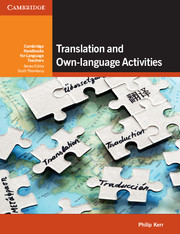Book contents
Summary
The previous chapter looked at classroom activities where use of the students’ own language contributed, in some way, to practice in using English. This chapter looks at activities where particular elements of English (such as vocabulary and grammar) are studied through a comparison with the learners’ language. The belief that contrasting particular features of a target language (in our case, English) and the learners’ own language can help the learner to acquire the former is one that has generated much debate.
Over fifty years ago, Robert Lado argued in his influential Linguistics across Cultures: Applied linguistics for language teachers that features of a foreign language that are similar to a student's native language will be easy to learn, and those that are different will be harder. Therefore, he reasoned, a teacher who has contrasted the two languages ‘will know better what the real learning problems are and can better provide for teaching them’ (Lado, 1957, p. 2). At the time, many, if not most, people agreed with him. One was the eminent linguist, Michael Halliday. While rejecting some traditional practices, such as the translation of isolated decontextualised sentences and the learning of word lists with translation equivalents, Halliday argued against those who were convinced that one should not pay attention to the learner's mother tongue. ‘Given the right conditions,’ he wrote, ‘one can make positive use of the student's mother tongue; and in such cases to neglect it may be to throw away one of the tools best adapted to the task in hand’ (Halliday, 2007, p. 161).
Not so, responded the next generation of linguists, and their arguments won the day. Most of the mistakes that language learners make are not caused by interference (or crossover) from their first language, they claimed, and ‘learners’ first languages are no longer believed to interfere with their attempts to learn second language grammar’ (Dulay et al., 1982, p. 5). Furthermore, it was argued, the use of translation in language learning actually caused mistakes through ‘negative transfer’ or ‘first language interference’. Lado and the school of Contrastive Analysis, with which he was closely connected, became deeply unfashionable.
- Type
- Chapter
- Information
- Translation and Own-language Activities , pp. 121 - 146Publisher: Cambridge University PressPrint publication year: 2014



